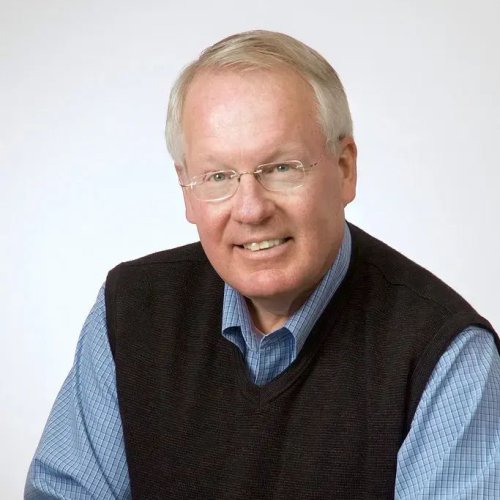The History of Ethical Fitness™
Rushworth M. Kidder and The Institute for Global Ethics

Rushworth M. Kidder
Rushworth M. Kidder was a thought-leader, journalist, speaker, and author who covered topics ranging from 20th century poets such as E.E. Cummings and Dylan Thomas to quantum physics, ethics, and civil discourse.
Kidder was born in Providence, Rhode Island and raised in Amherst, Massachusetts where his father, Dr. George Kidder, was a professor of biochemistry at Amherst College. As an honors graduate of Amherst College, Kidder maintained a lifelong interest in the Arts. He was a skilled jazz pianist and an authority on E.E. Cummings. (His research and writings on both the poet, also a painter, are now available at the Temple University Libraries Special Collection Research Center).
With a Ph.D. from Columbia University in English and Comparative Literature, Kidder loved ideas and words, as well as tracing the common moral values shared by humanity. John Yemma (former editor of The Christian Science Monitor) wrote of him “in a world where religion, morality, politics, and philosophy too often divide people, Dr. Kidder used ethics as an intercultural language to help people deal with challenges that in another age might have been settled by clerical decree or codes of conduct.”
After a decade teaching at Wichita State University in Kansas, Kidder joined The Christian Science Monitor in 1979 as London correspondent and bureau chief. Later, as feature editor in Boston, two of his essays from his weekly column "Perspectives," appeared in the American Society of Newspaper Editors' Best Newspaper Writing collection for 1983. He was one of the first western journalists to visit Chernobyl after the nuclear reactor accident in 1986, and traveled worldwide for a series on terrorism and another on marriage. In 1988, exploring how the concepts of matter, time, and space influence human thought, he wrote an award-winning, five-part series on quantum physics.
Throughout his journalistic career he often wove a thread of common moral values shared by all humanity into his work. In 1990, this led him to found the Institute for Global Ethics in Camden, Maine, coining the term "ethical fitness" and helping people identify and solve ethical dilemmas in their lives. With his wife and founding board member, Anne Elizabeth, he traveled extensively around the world speaking, writing, and teaching on the subject of ethics.
A longtime resident of Maine he delighted in writing essays, poetry, and commentary from his waterside writer’s cabin. But despite his loyalty to New England, he spent much of his time abroad working with the Institute’s European headquarters in London, or serving in his role as a trustee and making site visits for the Charles Stewart Mott Foundation.
Kidder passed away in March of 2012. Richard Crespin in a Forbes article from March 8, 2012 wrote “Rush set a bunch of people, me included, on fire. His words put a very needed boot in my very intellectually lazy backside, making me think differently about business as a wholly owned subsidiary of society… About the need for teaching a whole generation to think about its place in the world as a series of right versus right decisions.”
The Institute for Global Ethics
In April of 1990, Dr. Rushworth M. Kidder founded the Institute for Global Ethics (IGE), a 501(c)(3) nonprofit organization in Camden, Maine. The Institute was dedicated to exploring the idea of shared moral values as well as committed to helping organizations and individuals put those values into practice, finding frameworks that tackle tough issues. The mission of IGE was to promote ethical behavior in individuals, institutions, and nations through research, public discourse, and practical action. With a worldwide membership and an international headquarters in London, IGE was prolific in its work for over two decades. Having developed and trademarked the term Ethical Fitness™, Dr. Kidder and his team developed numerous resources (books, workbooks, curricula, etc.), trained hundreds of business-people, politicians, and teachers, delivered thousands of seminars, hosted radio shows, and published a weekly Ethics Newsline™ all based around Dr. Kidder’s seminal book, How Good People Make Tough Choices (1995).
In 2012, at the unexpected passing of Dr. Kidder, IGE’s Board of Directors faced a pivotal challenge: who would lead IGE into the future? After a widespread search, they hired a new president for the organization. During the following seven years under this new management, many key staff who had developed and championed so much of IGE’s work alongside Dr. Kidder left the organization. In 2019 IGE began the process of dissolving, and finally closed completely in 2020.
In February 2020, Dr. Kidder’s wife Anne Elizabeth and his daughters took steps to legally regain control of the copyrights for two of the books that formed the backbone of IGE’s framework and methodology: How Good People Make Tough Choices: Resolving the Dilemmas of Ethical Living (1995) and Moral Courage (2005). They also took legal steps to gain ownership of the Ethical Fitness™ trademark. While much of the content, research, and archives of IGE have been lost, the important content of the work that IGE carried out successfully for 22 years has now been secured and remains in the Kidder family.
Abby, a former IGE employee and licensed Ethical Fitness™ trainer for over ten years, along with her mother Anne Elizabeth, who was a founding board member of IGE, spent two years considering how best to share and utilize these copyrights. Abby carried out extensive research among ethics organizations around the world to determine where and how the Ethical Fitness™ content could best contribute to the ongoing ethics work that is happening globally. When an obvious partner did not surface, the family decided to create a website resource that would be free and accessible to anyone, anywhere, to use and share. This website not only centralizes the resources, but allows easy access to useful, pragmatic, and relevant resources.
With help from former IGE donors, trainers, consultants, and staff much of the content has been collected. It will now be available on this website free of charge. With the support of many generous donors and the corporate sponsorship of The J.M. Smucker Co., these works are once again available.

